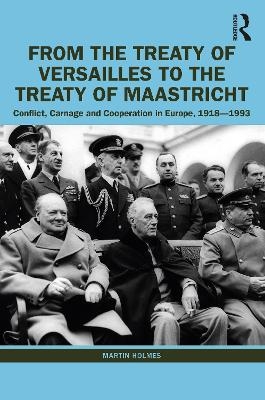
From the Treaty of Versailles to the Treaty of Maastricht
Routledge (Verlag)
978-1-032-19814-9 (ISBN)
Taking the Treaty of Versailles, signed following World War I, as a starting point, the volume argues that while it was well-intentioned to the point of being utopian, it was also totally impractical, rearranging the map of Europe in a way which led to the tragic descent into conflict and barbarism in World War II. The volume then moves through the post war period, the outcome of the war producing the uneasy stability of a Cold War divided continent, and with the establishment of NATO in 1949, the process of European integration ushered in the era of cooperation. Under the influence of Charles de Gaulle, the newly created European Community acted as an association of sovereign states led by France and Germany, spurring economic growth and encouraging other countries to apply to join. After de Gaulle’s retirement in 1969, this approach was progressively abandoned in favour of a federal model of integration in which member states transferred their sovereignty to the institutions of what became the European Union. Europe was to be transformed from a continent to a country. The book concludes by analysing the Maastricht treaty, which enshrined this process, as being as fatally flawed as the Versailles Treaty and charts the post-Maastricht slow decline of the European Union giving way to widespread Euroscepticism.
From the Treaty of Versailles to the Treaty of Maastricht will appeal to researchers and students alike interested in European history, politics and World War I and II.
Martin Holmes is a Senior Common Room member at St Hugh’s College, Oxford, UK, where he was formerly Lecturer in Politics specialising in European and British history. Previously he was a Senior Visiting Research Fellow at Mansfield College, Oxford. Since 1989 he has been Program Director of the University of Nebraska annual summer school at Oxford on which he is Lecturer in Post War British Economic History. He is the author of six books including The Labour Government 1974-79: Political Aims and Economic Reality (1985), Thatcherism: Scope and Limits (1989) and European Integration: Scope and Limits (2001).
1. The legacy of the Versailles Treaty 2. Mussolini’s ‘Roman Empire’ 3. German foreign policy from Stresemann to Hitler 4. International implications of the Spanish Civil War 5. Soviet foreign policy 1918 – 1941 6. Chamberlain, Churchill and the appeasement debate 7. Diplomatic and political objectives of the Axis powers 8. Diplomatic and military objectives of the Allied powers 9. Origins of the Cold War in Europe 10. Suez 1956: Anglo French humiliation as Cold War America asserts it power 11. Origins of European integration after 1945 12. Why Britain did not join the EEC in the 1950’s 13. How Britain joined the EEC in 1973 14. 1973 enlargement: Denmark and Ireland join but not Norway 15. De Gaulle, Brandt and relations with USA and USSR 16. From customs union to Werner Report, 1957 – 1970 17. 1970’s crisis and the abandonment of the Werner Plan 18. Jacques Delors, the Single Market, Eastern Europe and German unification 19. Margaret Thatcher: Resisting Delors and opposing the Maastricht Treaty
| Erscheinungsdatum | 21.07.2022 |
|---|---|
| Verlagsort | London |
| Sprache | englisch |
| Maße | 156 x 234 mm |
| Gewicht | 500 g |
| Themenwelt | Geschichte ► Allgemeine Geschichte ► Neuzeit (bis 1918) |
| Geschichte ► Allgemeine Geschichte ► Zeitgeschichte | |
| Geisteswissenschaften ► Geschichte ► Regional- / Ländergeschichte | |
| Sozialwissenschaften ► Politik / Verwaltung ► Europäische / Internationale Politik | |
| ISBN-10 | 1-032-19814-1 / 1032198141 |
| ISBN-13 | 978-1-032-19814-9 / 9781032198149 |
| Zustand | Neuware |
| Haben Sie eine Frage zum Produkt? |
aus dem Bereich


